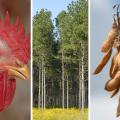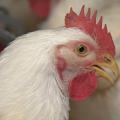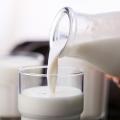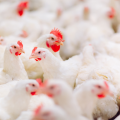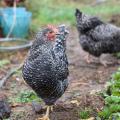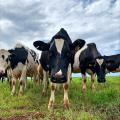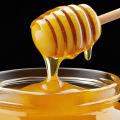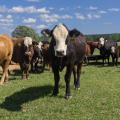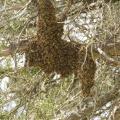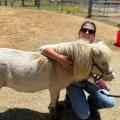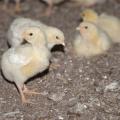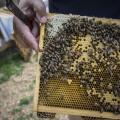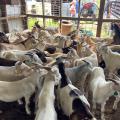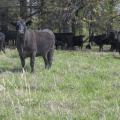News Filed Under Livestock
RAYMOND, Miss. -- Mississippi’s agriculture industry remains vibrant with an overall production value estimated at $9 billion, despite a drop in row crop prices.
STARKVILLE, Miss. -- 2024 marks the 30th consecutive year for poultry to outperform every other agricultural commodity in Mississippi, and for the second time in three years, its farm gate value fell just shy of $4 billion.
“We have seen a ramp-up in both broiler and table egg production in 2024 compared to production rates seen in 2023,” said Jonathan Moon, poultry specialist with the Mississippi State University Extension Service. “This increase in meat and egg production directly impacts the value of the state’s commercial poultry industry.”
STARKVILLE, Miss. -- A federal raw milk testing mandate has been issued to address bird flu outbreaks in U.S. dairy herds.
The U.S. Department of Agriculture’s Animal and Plant Health Inspection Service, or APHIS, declared the federal order Dec. 6 in response to more than 700 herds in 16 states having tested positive for H5N1. The agency billed the announcement as the start of its National Milk Testing Strategy program.
Did you know there is a difference in broilers and layers? Broilers and layers both serve important roles in the poultry industry, but their roles are very different.
STARKVILLE, Miss. -- Amy Knight has seen her 13-year-old son, Cameron, make substantial strides in his speech and core strength since he began horse riding three years ago.
Scratch, peck, dirt bath. Repeat.
If you know what this phrase refers to, you probably own backyard chickens.
STARKVILLE, Miss. -- Despite encouraging milk prices, margins still project to be tight for Mississippi dairy farmers in 2024.
The latest World Agricultural Supply and Demand Estimates report from the U.S. Department of Agriculture forecasted this year’s average all-milk price at $21.60 per hundredweight nationally. Josh Maples, an agricultural economist with the Mississippi State University Extension Service, said this is an improvement from last year, but still below 2022 levels, when prices hovered around $25 per hundredweight.
RAYMOND, Miss. -- Longtime dairy farmers David and Will Gilmer made the tough decision six years ago to get out of the dairy cattle business. The father-and-son team decided to transition their farm to beef cattle. However, the beef cattle business comes with its own stressful challenges.
There is nothing like the taste of a sweet spoon of honey. The versatility of honey makes it a very useful item to have around the kitchen, and for that reason, raising honeybees and selling the honey has become increasingly popular.
RAYMOND, Miss. -- Beef cattle prices are the best they have been in nearly a decade for Mississippi’s producers, but they face some tough management challenges to ensure their operations are profitable.
Have you ever seen a honey bee swarm? Seeing hundreds of bees clumped together on a tree, shrub, fence, house, or other object can be both fascinating and scary. If you’re like me, it can also be intimidating!
STARKVILLE, Miss. -- The transmission risk of H5N1 bird flu to humans remains minimal despite a rise in confirmed cases in dairy cows and poultry in several states and the first known case of a person catching the virus from a mammal.
RAYMOND, Miss. -- Small ruminants are a popular choice for people like J.T. Crownover who want to get into the livestock business but do not want to raise cattle. Crownover attended the Central Mississippi Research and Extension Center’s Producer Advisory Council meeting Feb. 20. The forum, where agricultural producers can discuss their needs with MSU administrators, researchers, specialists and Extension agents, was the catalyst for the university’s active small ruminant program.
BILOXI, Miss. -- Many cattle producers in Mississippi like Bobby Jones do not have access to a dedicated large-animal veterinarian.
This was one of the many needs voiced during the 2024 Producer Advisory Council meeting on Jan. 25 at the Mississippi State University Coastal Research and Extension Center in Biloxi. The annual meeting serves as a forum for agricultural producers to discuss their needs with university administrators, researchers, specialists and Extension agents.
Although much of civilization is intertwined with the use of horses, these animals are much more than beasts of burden, and research today continues to look at the bond between horses and humans.
Mississippi’s poultry took an estimated 23% loss in value in 2023; though production was strong, a failure to meet the previous year’s record high prices was responsible for the hit. Poultry generated an estimated $3.1 billion to Mississippi agriculture in 2023, down from the $3.9 billion generated in 2022.
Mississippi hay growers harvested at least 28 percent less hay this year than usual because of the drought that reached extreme levels in parts of the state. Brett Rushing, Mississippi State University Extension forage agronomist, said hay producers in the state typically get three cuttings a year, and often four if they manage well and the weather cooperates.
Despite widespread populations of honeybees and the major implications of their health, there are few direct options for beekeepers to reduce viral disease transmission to queens. Two apiculturists with the Mississippi State University Extension Service are out to improve the health and quality of queen bees while collaborating with their breeders.
LEAKESVILLE, Miss. -- Most goat meat sold in the U.S. is imported, but a group of Mississippi meat goat producers wants to see that change. A first-of-its-kind test in the state is underway to help them meet that goal. The Southeastern Buck Performance Test aims to improve the profitability of the meat goat industry in the region by improving meat goat genetics.
Mississippi cattle operations must constantly improve efficiency to remain profitable, as rising production costs are decreasing the benefit of high market prices. Brandi Karisch, beef specialist with the Mississippi State University Extension Service, said beef production is a significant component of the state’s agricultural economy, with a total estimated value of $318 million in 2022.

